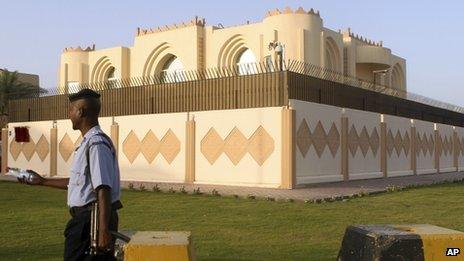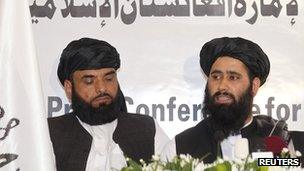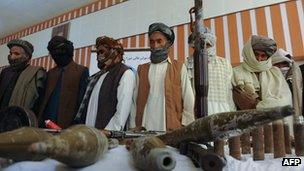How Taliban talks have become deadlocked in Doha
- Published

There is little activity now at the Taliban's Doha office
Reports in recent days have suggested that the Taliban have closed their office in Doha, bringing an end to hopes that peace talks could begin between the insurgents, the US and the Afghan government. The BBC World Service's Dawood Azami assesses the implications of the move.
The dialogue in Doha did not get off to a good start - in fact the Taliban have never really used their office there since it opened in June.
From the outset, Afghan President Hamid Karzai angrily reacted to the Taliban opening their office with such pomp and pride.
He demanded its closure and postponed a planned visit by members of Afghanistan's High Peace Council to meet Taliban representatives there.
The president said there had been a conspiracy to divide Afghanistan, undermine his authority and promote the Taliban as an alternative government.
The US joined him in criticising the Taliban for opening their office with such fanfare and put pressure on the Qataris to order the removal of the Taliban flag from the building.
In addition they wanted the removal of the name plaque which bore the inscription of the Islamic Emirate of Afghanistan - used by the Taliban when they came to power in the 1990s.
Matter of honour
Qatari officials duly removed the plaque and flag within two days of the office opening. This left the Taliban feeling that they had been lied to and disrespected.

Taliban representatives in Doha have not made much use of their office
They have not entered the building since the plaque and flag were removed. The issue has now become a matter of honour for all sides, who are now waiting to hear from each other.
The US and Afghan government are waiting as to see whether the Taliban will resume the talks under new conditions.
But the Taliban are waiting to see if the US and the Afghan government will be willing to meet them on their terms - they want the office with their name and flag.
A face-saving mechanism is now urgently required that is acceptable to all sides.
One solution might be for the Taliban to display their plaque and flag less prominently - inside the office - that would dispel any impression the building is an embassy.
The Afghan government insists that the office should only be used for provisional peace talks, and that it must not become a venue for the Taliban to present themselves as an alternative to the Afghan government or a government-in-exile.
It also insists that talks must be face-to-face between the High Peace Council and "authorised Taliban representatives".
It says that after initial contacts are made, the venue should move to Afghanistan and the second or third round of talks must take place there.
At the same time the Taliban are having an internal debate over their approach to peace talks.
Some in their ranks, especially the hardline field commanders, are opposed to the whole idea, saying that they have an upper hand in the battlefield and Nato is leaving anyway. For many Taliban fighters, the main motivation to fight is the presence of foreign forces in Afghanistan.
US recognition
The Taliban opened the Doha office to show to the world that they are not just an unruly bunch of rebels but also a political force familiar with diplomatic intricacies.

The Taliban show no sign of weakening despite government-arranged surrender ceremonies
The rebels want to raise their international profile. But as a starter, they want three things to happen which will appease those Taliban not happy with the idea of peace talks.
The release of a number of Taliban prisoners from Guantanamo Bay in exchange for Bowe Bergdahl, the American soldier in Taliban captivity since June 2010
The removal of Taliban names from a US/UN blacklist
Acknowledgment by the US that the Taliban are a "reality" as a political and military force
From the outset the Taliban have said that they want to talk to the US, as they see the Americans as the main party in the conflict.
They say that they are also prepared to talk to "all Afghans" which might include the government and its High Peace Council. But they maintain that this is of secondary importance and an internal Afghan issue to be addressed at a "proper" time.
The Doha talks have in short been dogged by mutual suspicion and conspiracy theories.
So while President Karzai thinks that the Taliban's Qatar office promoted the militants as an alternative to the government in Kabul, the Taliban are of the opinion that the government and the US are not sincere or serious about peace talks and want to divide and weaken them.
The failure of the Doha talks has resulted in President Karzai suspending talks with the US on a bilateral security agreement - under which several thousand US soldiers could remain in up to nine different locations across Afghanistan after the Nato withdrawal in 2014.
Washington however has threatened a "zero option" - the complete withdrawal of all its forces at the end of next year - if the agreement is not signed.
So in one respect, the controversies surrounding the office have in fact made the peace process more difficult and complicated.
Accusations and counter-accusations have widened the gap and the level of mistrust between all the three main parties concerned.
In the long run, though, it is likely that the negotiations process will resume at some stage, as all sides still want to talk. But it will take time.
It is also possible that the Qatar office might not open again at all and that another country will be used. Saudi Arabia is one of the preferred venues of the Afghan government.
In the meantime everyone realises that time is running out in Afghanistan. Nato is withdrawing its forces, and President Karzai's term ends with elections in April 2014. Foreign economic aid is likely to decrease.
The challenge now is how to balance the strategic patience needed in such a complicated peace process with the realities on the ground in Afghanistan and in the wider region.
- Published29 June 2013
- Published30 June 2013
- Published22 June 2013